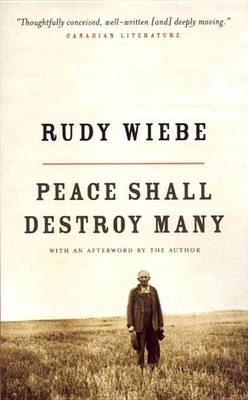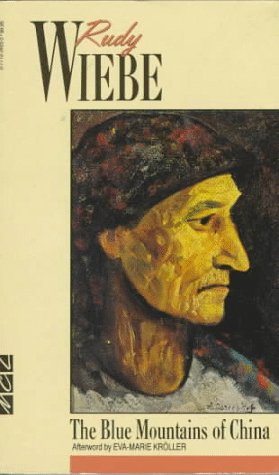New Canadian Library S.
4 total works
In 1944, as war rages across Europe and Asia, famine, violence and fear are commonplace. But life appears tranquil in the isolated farming settlement of Wapiti in northern Saskatchewan, where the Mennonite community continues the agricultural lifestyle their ancestors have practised for centuries. Their Christian values of peace and...Read more
In 1944, as war rages across Europe and Asia, famine, violence and fear are commonplace. But life appears tranquil in the isolated farming settlement of Wapiti in northern Saskatchewan, where the Mennonite community continues the agricultural lifestyle their ancestors have practised for centuries. Their Christian values of peace and love lead them to oppose war and military service, so they are hardly affected by the war – except for the fact that they are reaping the rewards of selling their increasingly valuable crops and livestock.
Thom Wiens, a young farmer and earnest Christian, begins to ask questions. How can they claim to oppose the war when their livestock become meat to sustain soldiers? How can they enjoy this free country but rely on others to fight to preserve that freedom? Within the community, conflicts and broken relationships threaten the peace, as the Mennonite tradition of close community life manifests itself as racism toward their “half-breed” neighbours, and aspirations of holiness turn into condemnation of others. Perhaps the greatest hope for the future lies with children such as Hal Wiens, whose friendship with the Métis children and appreciation of the natural environment offer a positive vision of people living at peace with themselves and others.
Wiebe’s groundbreaking first novel aroused great controversy among Mennonite communities when it was first published in 1962. Wiebe explains, “I guess it was a kind of bombshell because it was the first realistic novel ever written about Mennonites in western Canada. A lot of people had no clue how to read it. They got angry. I was talking from the inside and exposing things that shouldn't be exposed.” At the same time, other reviewers were unsure how to react to Wiebe’s explicitly religious themes, a view which Wiebe found absurd. “There are many, many people who feel that religious experience is the most vital thing that happens to them in their lives, and how many of these people actually ever get explored in modern novels?”
The concept of peace is an important theme in Wiebe’s first three books. The attempt to live non-violently, one of the basic tenets of the Mennonite faith as taught by the sixteenth-century spiritual leader Menno Simons, is what has “caused the Mennonites the most difficulty in their relationship with everybody,” forcing them to move again and again. The theme of peace versus passivity is further explored in The Blue Mountains of China, where inner peace, a state of being, is contrasted with the earthly desire for a place of public order and tranquility where the church is “there for a few hours a Sunday and maybe a committee meeting during the week to keep our fire escape polished,” as Thom, the protagonist puts it.. Wiebe has said, “To be an Anabaptist is to be a radical follower of the person of Jesus Christ . . . and Jesus Christ had no use for the social and political structures of his day; he came to supplant them.”
While Peace Shall Destroy Many takes place in a Mennonite community, its elements are universal, delineating the way young idealism rebels against staid tradition, as a son clashes with his father. In the face of violent confrontations between beliefs all over the world, the novel remains as compelling now as it was nearly forty years ago.
Thom Wiens, a young farmer and earnest Christian, begins to ask questions. How can they claim to oppose the war when their livestock become meat to sustain soldiers? How can they enjoy this free country but rely on others to fight to preserve that freedom? Within the community, conflicts and broken relationships threaten the peace, as the Mennonite tradition of close community life manifests itself as racism toward their “half-breed” neighbours, and aspirations of holiness turn into condemnation of others. Perhaps the greatest hope for the future lies with children such as Hal Wiens, whose friendship with the Métis children and appreciation of the natural environment offer a positive vision of people living at peace with themselves and others.
Wiebe’s groundbreaking first novel aroused great controversy among Mennonite communities when it was first published in 1962. Wiebe explains, “I guess it was a kind of bombshell because it was the first realistic novel ever written about Mennonites in western Canada. A lot of people had no clue how to read it. They got angry. I was talking from the inside and exposing things that shouldn't be exposed.” At the same time, other reviewers were unsure how to react to Wiebe’s explicitly religious themes, a view which Wiebe found absurd. “There are many, many people who feel that religious experience is the most vital thing that happens to them in their lives, and how many of these people actually ever get explored in modern novels?”
The concept of peace is an important theme in Wiebe’s first three books. The attempt to live non-violently, one of the basic tenets of the Mennonite faith as taught by the sixteenth-century spiritual leader Menno Simons, is what has “caused the Mennonites the most difficulty in their relationship with everybody,” forcing them to move again and again. The theme of peace versus passivity is further explored in The Blue Mountains of China, where inner peace, a state of being, is contrasted with the earthly desire for a place of public order and tranquility where the church is “there for a few hours a Sunday and maybe a committee meeting during the week to keep our fire escape polished,” as Thom, the protagonist puts it.. Wiebe has said, “To be an Anabaptist is to be a radical follower of the person of Jesus Christ . . . and Jesus Christ had no use for the social and political structures of his day; he came to supplant them.”
While Peace Shall Destroy Many takes place in a Mennonite community, its elements are universal, delineating the way young idealism rebels against staid tradition, as a son clashes with his father. In the face of violent confrontations between beliefs all over the world, the novel remains as compelling now as it was nearly forty years ago.
For readers of Wiebe's Of This Earth: A Mennonite Boyhood in the Boreal Forest and Sandra Birdsell's The Russländer.
An epic novel on the Mennonite experience, by a Governor General's Award-winning author.
An epic novel on the Mennonite experience, by a Governor General's Award-winning author.
“What can that mean, I and my family will have a ‘reserve of one square mile’?”
So asks Big Bear of Governor Morris, come to impose a square treaty on the round, buffalo-covered world of the Plains Cree. As the buffalo vanish and the tension builds to the...Read more
So asks Big Bear of Governor Morris, come to impose a square treaty on the round, buffalo-covered world of the Plains Cree. As the buffalo vanish and the tension builds to the...Read more
“What can that mean, I and my family will have a ‘reserve of one square mile’?”
So asks Big Bear of Governor Morris, come to impose a square treaty on the round, buffalo-covered world of the Plains Cree. As the buffalo vanish and the tension builds to the second Riel Rebellion, Big Bear alone of the prairie chiefs keeps up pressure for a better treaty by refusing to choose a reserve. He argues, “If any man has the right to put a rope around another man’s neck, some day someone will get choked.”
It is Big Bear’s story – and the story of Wandering Spirit, of Kitty McLean and John McDougall–that is told in this novel with rare and penetrating power. Permeated with a sense of place and time, this eagerly awaited work by Rudy Wiebe reflects the author’s sensitivity to the Canadian prairies, their history, the minds and hearts of their diverse people.
Exploring Big Bear’s isolated struggle, Wiebe has encompassed in one creative sweep not only his hero’s struggle for integrity, but the whole range and richness of the Plains culture. Here is the giant circle of the prairie horizon, and the joy, the sorrow, the pain and the triumph and the violence of unconquerable human beings faced with destruction.
So asks Big Bear of Governor Morris, come to impose a square treaty on the round, buffalo-covered world of the Plains Cree. As the buffalo vanish and the tension builds to the second Riel Rebellion, Big Bear alone of the prairie chiefs keeps up pressure for a better treaty by refusing to choose a reserve. He argues, “If any man has the right to put a rope around another man’s neck, some day someone will get choked.”
It is Big Bear’s story – and the story of Wandering Spirit, of Kitty McLean and John McDougall–that is told in this novel with rare and penetrating power. Permeated with a sense of place and time, this eagerly awaited work by Rudy Wiebe reflects the author’s sensitivity to the Canadian prairies, their history, the minds and hearts of their diverse people.
Exploring Big Bear’s isolated struggle, Wiebe has encompassed in one creative sweep not only his hero’s struggle for integrity, but the whole range and richness of the Plains culture. Here is the giant circle of the prairie horizon, and the joy, the sorrow, the pain and the triumph and the violence of unconquerable human beings faced with destruction.


